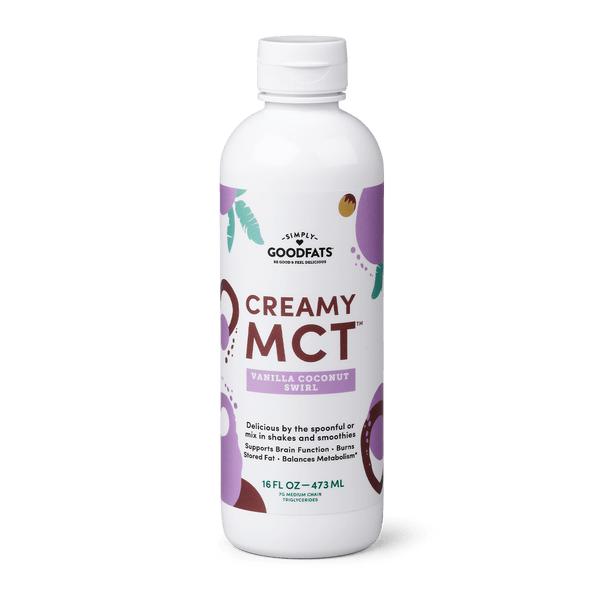The Truth About Healthy Fats: What They Are & Why You Need Them
Whenever I mention healthy fats, I’m inevitably met with some skepticism. Why? Well, many of us have been trained our entire lives that fats make you gain weight, clog your arteries, and put your health at serious risk. But that simply isn’t true.
Fats have been terribly misunderstood for decades. You see, not all fats are created equal. There are, in fact, healthy fats that we need to consume on a regular basis for optimal wellness.
These healthy fats provide energy, support heart and brain health, and can even improve body composition! The simple fact of the matter is that you never have to fear the word “fats” again; you just have to know which healthy fats to add to your diet and which ones to avoid—and that’s exactly what we’re going to review along with the best sources and major health benefits of healthy fats.
What Are Healthy Fats?
While we’ve been conditioned to believe that eating fat can actually make us fat, the exact opposite is true—if you’re consuming healthy fats, that is. In fact, eating a good amount of healthy fats is key on low carb diets such as keto and paleo, and absolutely required on the keto diet in order to enter into the fat-burning phase of ketosis.
Personally, healthy fat is the single most important macro in my life by a long shot. Every day, I ask myself not only if I’m getting enough fat in my diet but if I’m getting the right types of healthy fats to help cool inflammation and maintain optimal energy. In fact, my personal motto is: “Fats first, carbs last.”
So, what are healthy fats? To answer this question, we must first look at what fats are.
Just like proteins and carbohydrates, fats are nutrients that the body needs in order to function optimally. Now, your body cannot make certain types of fat, which means you have to get them from your diet. These fats are known as essential fats, which you may know as omega-3 and omega-6 fatty acids.
A major reason fats have a bad reputation is because they are more calorie-dense than the other two macronutrients. While protein and carbohydrates have four calories per gram, fat has nine calories per gram—more than twice as many calories by weight compared to proteins and carbohydrates. This has led many people to avoid fats, thinking the higher calorie content is bad for them.
The truth is that fats play an important role when it comes to having energy, absorbing other nutrients from your diet, maintaining cell health, and much more. But you need to consume healthy fats in order to maximize the benefits of fat.
Types of Healthy Fats
Now, healthy fats are known as monounsaturated and polyunsaturated fats as well as some saturated fats. Conversely, unhealthy fats are trans fats, which are created when vegetable oil goes through a hydrogenation process.
Healthy fats such as monounsaturated and polyunsaturated fats are sourced mainly from whole foods, such as vegetables, fruit, nuts, seeds, and fatty fish. Some saturated fats, such as whole fat dairy, coconut oil (a great source of MCTS, or medium-chain triglycerides—a wonderful source of healthy fat), and pasture-raised beef can serve as healthy sources of fat as well.
Two of the healthiest fat sources you can consume are MCTs and omega-3 fatty acids. Saturated fats are made up of a chain of triglycerides, and these chains are differentiated into three categories: long, medium, and short-chain triglycerides.
Your body makes short-chain triglycerides (or short-chain fatty acids) when you break food down inside the digestive tract. Short-chain triglycerides can play a major role in maintaining healthy gut bacteria and can be found in fiber-rich foods.
MCTs can support metabolism and improve both exercise performance and the gut microbiome. Plus, because they are shorter in structure, MCTs are easier for your body to absorb and put to good use since your body doesn’t have to work as hard to break them down.
Meanwhile, omega-3 fatty acids are unsaturated fats that have been shown to provide a wide range of health benefits, including improved cholesterol balance. Omega-3s also can help protect the membranes around your cells in your eyes and brain.
When trying to determine if your fat is healthy, remember that if your fat source is processed or fried, chances are high that it’s an unhealthy trans fat. In this case, avoid these high-fat foods.
If you need some help determining which fats are healthy and which aren’t, take a look at the list below to get yourself started.
List of Healthy Fats
Now that you know what healthy fats are, let’s look at my top healthy fats list. Here are 10 healthy fats you should be consuming on a regular basis, which happen to be some of my top healthy fats for keto, too, in case you’re planning to follow a keto diet.
- Avocados
- Cheeses
- Coconut oil
- Chia seeds
- Flaxseed
- Grass-fed butter
- Olive oil
- Walnuts
- Whole milk and yogurt from grass-fed cows
- Wild-caught fish (especially fatty cold-water fish like salmon, trout, sardines, and herring)
6 Benefits of Healthy Fats
Now that we’ve discussed which fats you should be eating, let’s take a closer look at some of the top reasons why healthy fats are your friend. Here are six of the top health benefits you can expect from eating healthy fats.
1. Improve energy
Along with carbohydrates, fats play an important role when it comes to energy. But you may be surprised to learn that when you eat one gram of healthy fat, you’re giving your body more than twice the amount of energy you would get from proteins or carbohydrates!
Consuming healthy fats can go a long way in supporting exercise endurance, too! When you exercise, your body burns carbohydrates first (for example, the banana or oatmeal you ate before you hopped on the treadmill). And after 20 minutes of continuous, moderate activity, your body taps into the fat stores in your body to keep you going.
2. Support hair and skin health
Fats are also extremely helpful when it comes to keeping your hair and skin healthy. Healthy fats not only help to keep your skin hydrated but also protect and make up the precious lipid layer that surrounds every skin cell membrane.
Meanwhile, emerging research suggests that consuming omega-3 fatty acids may support hair growth and even thickness.
3. Promote satiety
Research has shown that consuming healthy fats, and MCTs in particular, may help reduce overall food intake by promoting satiety, which is the signal your brain gives your body that you’re full. In fact, studies confirmed that eating an MCT-rich breakfast caused participants to eating less calories at lunch.
4. Support nutrient absorption
Another benefit of healthy fats is that they aid in the absorption of certain vitamins and minerals. Many vitamins, such as vitamins A, D, E, and K, are fat-soluble vitamins, meaning they need fat in order to be broken down and utilized in your body. Conversely, if you don’t eat enough healthy fats, your body won’t be able to absorb fat-soluble nutrients, leaving you at risk of a nutritional deficiency.
5. Boost metabolism and burn fat
Healthy fats such as MCTs are metabolized differently, meaning they’re more likely to be burned as fuel than stored as fat. As a result, they are known to support a healthy metabolism. Additionally, MCTs support exercise performance, which is known to increase metabolism as well.
6. Support a healthy gut microbiome
Finally, research has shown that both MCTs and omega-3 fatty acids can positively impact the gut microbiome and help to maintain the integrity of your intestinal wall. And additional human and animal studies have confirmed that omega-3s have the ability to influence the gut-brain axis through its impact on gut microbiota.

Unhealthy Fats to Avoid
While eating healthy fats offer a variety of benefits, consuming unhealthy fats such as trans fats can harm your health in a variety of ways, from increasing your risk of developing heart disease and stroke to causing elevated blood sugar levels.
Accordingly, it’s best to not consume these unhealthy fats, which means you’ll want to avoid oils that are solid at room temperature, fried foods, and margarine. It’s also important to note that trans fats are often hiding in some common foods, such as fast food, chips, crackers, cookies, prepackaged items, and even some baked goods!
It can be hard to determine which foods contain trans fats, and that’s why I recommend eating as many organic whole foods as possible and sticking with pasture-raised animal protein over grab-and-go food.
Healthy Fats in a Supplement?
While it’s best to start with your diet in regards to consuming healthy fats, it’s important to know that there are ways to supplement with healthy fats as well.
Personally, I love to use organic MCT oil in place of coconut oil whenever possible to make sure I’m getting as much benefit from this healthy fat as possible. I often drizzle this delicious-tasting Creamy MCT Vanilla Coconut Swirl on my food and incorporate it into shakes and smoothies. I even use it as a delicious creamer in coffee, such as in this peppermint mocha. The options are almost endless and it’s a great way to ensure your body is getting the valuable fats it needs for opktimal function.
In Summary:
- Fats have been terribly misunderstood for decades, with a common misconception that all fats are “bad.” There are actually healthy fats that we need to consume on a regular basis that provide energy, support heart and brain health, and can even improve body composition!
- Healthy fats are known as monounsaturated and polyunsaturated fats as well as some saturated fats. These are found in whole foods. Conversely, unhealthy fats are trans fats, which are created when vegetable oil goes through a hydrogenation process.
- Some of the major health benefits of consuming healthy fats include improving your energy, hair and skin health, satiety, nutrient absorption, metabolism, and even the gut microbiome.
- While I recommend beginning with your diet, you can also supplement with healthy fats by regularly using organic MCT oil in your foods.

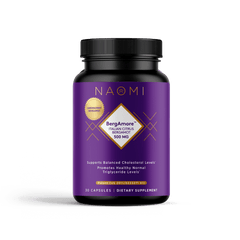
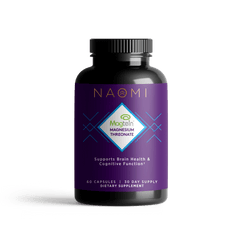





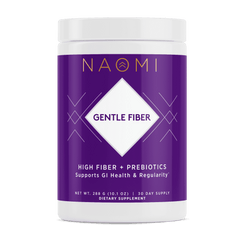
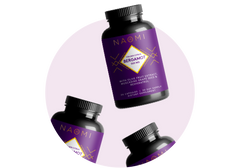
.png?v=1662086163999&options=w_100)
